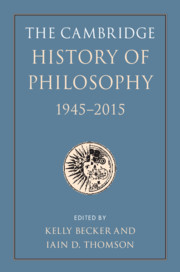Book contents
- The Cambridge History of Philosophy, 1945–2015
- The Cambridge History of Philosophy, 1945–2015
- Copyright page
- Contents
- Contributors
- Preface and Acknowledgments
- Introduction
- Part I Analytic Philosophy
- Part II Continental Philosophy
- Part III Bridge Builders, Border Crossers, Synthesizers, and Comparative Philosophy
- Section Eight Bridge Builders, Border Crossers, Synthesizers
- 42 Rethinking the Analytic/Continental Divide
- 43 Phenomenology and Ordinary Language Philosophy
- 44 Phenomenology Meets Philosophy of Mind and Language
- 45 The Impact of Pragmatism
- 46 Unruly Readers, Unruly Words
- 47 Anglo-American Existential Phenomenology
- 48 A Conceptual Genealogy of the Pittsburgh School
- Section Nine Comparative Philosophy
- Part IV Epilogue: On the Philosophy of the History of Philosophy
- References
- Index
44 - Phenomenology Meets Philosophy of Mind and Language
from Section Eight - Bridge Builders, Border Crossers, Synthesizers
Published online by Cambridge University Press: 08 November 2019
- The Cambridge History of Philosophy, 1945–2015
- The Cambridge History of Philosophy, 1945–2015
- Copyright page
- Contents
- Contributors
- Preface and Acknowledgments
- Introduction
- Part I Analytic Philosophy
- Part II Continental Philosophy
- Part III Bridge Builders, Border Crossers, Synthesizers, and Comparative Philosophy
- Section Eight Bridge Builders, Border Crossers, Synthesizers
- 42 Rethinking the Analytic/Continental Divide
- 43 Phenomenology and Ordinary Language Philosophy
- 44 Phenomenology Meets Philosophy of Mind and Language
- 45 The Impact of Pragmatism
- 46 Unruly Readers, Unruly Words
- 47 Anglo-American Existential Phenomenology
- 48 A Conceptual Genealogy of the Pittsburgh School
- Section Nine Comparative Philosophy
- Part IV Epilogue: On the Philosophy of the History of Philosophy
- References
- Index
Summary
This chapter appraises ways in which phenomenology interacted with philosophy of mind and philosophy of logic and language between 1945 and 2015. During this period, as the post-war phenomenological tradition engaged with and drew from evolving theories in logic, philosophy of language, philosophy of mind, and cognitive neuroscience, the phenomena of intentionality, meaning, and consciousness gained renewed salience. As a result of these particular engagements (especially with Fregean and possible world semantics, the information-processing model of mind, and the cognitive study of phenomenal intentionality), both intentional and phenomenal aspects of consciousness have come to the fore with renewed vigor, embracing “what it is like” to experience perception, thought, emotion, and action.
- Type
- Chapter
- Information
- The Cambridge History of Philosophy, 1945–2015 , pp. 603 - 623Publisher: Cambridge University PressPrint publication year: 2019
- 1
- Cited by



